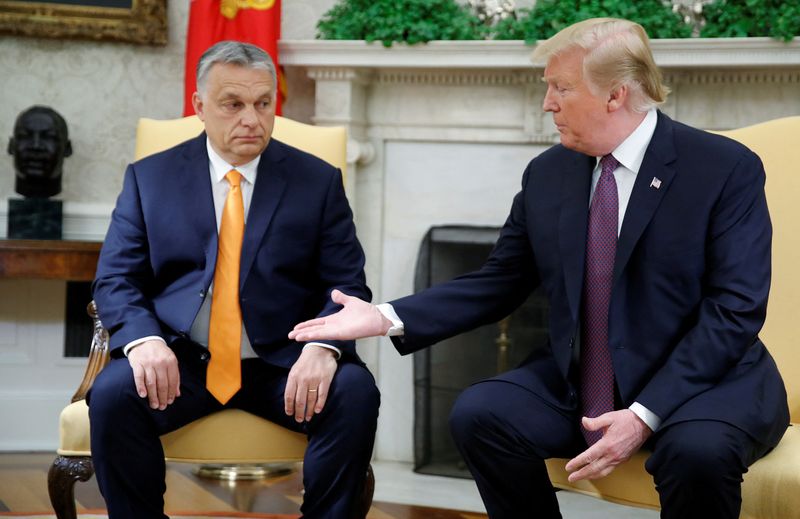By Gergely Szakacs and Karin Strohecker
BUDAPEST/LONDON (Reuters) - Donald Trump's victory may be a political boon for Hungarian leader Viktor Orban but on the economy, Trump is bad news for Hungary - adding to inflationary risks due to a weak forint and lower output due to possible tariffs on Europe's auto sector.
With the forint already on the back foot since the Hungarian central bank's latest rate cut in September, Trump's stunning win sent central Europe's worst-performing currency to levels last seen in 2022, when the bank launched emergency rate hikes.
Some strategists and fund managers say that could be just a prelude to bigger falls if Trump, who has described tariffs as "the most beautiful word in the dictionary", makes good on his campaign pledges of higher tariffs on China and Europe.
"The Trump election victory adds fresh risks for Hungary," said Roger Mark, an analyst at fund manager Ninety One, adding however that the forint's moves following the U.S. election have been "a lot better than expected" despite initial falls.
"As a very open economy heavily linked to the European auto sector, HUF could come under renewed pressure," Mark said. "This could preclude rate cuts and even lead to possible rate hikes in the months ahead."
The European Commission has already begun modelling the impact on the bloc as a whole and on those nations likely to be hardest hit. They could include major car producer Germany and Italy, the second largest EU exporter to the United States.
Central Europe has deep trade ties to Germany and its car sector, with the region sending 20% to 30% of its exports to Europe's biggest economy, which Nomura says is likely to be more affected by U.S. tariffs than other euro area members.
By Nov. 7, investors had priced out nearly all rate easing in Hungary on a 12-month horizon compared with cuts worth some 140 basis points projected in late-September, based on J.P. Morgan data - by far the biggest pullback in central Europe.
Societe Generale (OTC:SCGLY) strategist Marek Drimal said despite still running the EU's highest base rate at 6.5%, Hungary's central bank had probably overdone rate easing amid uncertainties related to the U.S. election and a leadership change due at the bank.
CREDIBILITY TEST
Faced with a weak economy, Orban's government has repeatedly piled pressure on the central bank to cut rates sharply as Orban gears up for what could be a closely fought 2026 election.
Finance Minister Mihaly Varga, who is widely expected to succeed Orban critic Gyorgy Matolcsy as governor next March, has said inflation should be the bank's top priority, but it also needs to "co-operate" with the government on economic policy.
Some investors are concerned that an Orban-aligned majority of policymakers could lead to sharper rate cuts to boost growth ahead of the election, hitting the forint and stoking inflation, which scaled the EU's highest levels of more than 25% last year.
"The next governor will have to make the choice between reinforcing the credibility and independence of the central bank by focusing on its core objective, achieving price stability, or cave in to mounting political pressures to support economic growth," Viktor Szabo, a fund manager at abrdn, said.
UniCredit says the forint could test its late-2022 record lows, with the weak economy posing additional risks.

"We expect the HUF to remain under pressure over the forecast horizon due to the risk of U.S. tariffs, local geopolitics and weak economic performance," economists at Barclays (LON:BARC) said in a note.
"The forint remains the most vulnerable CEE currency to risks associated with global trade amid its focus on car manufacturing and high exposure to Chinese investment."